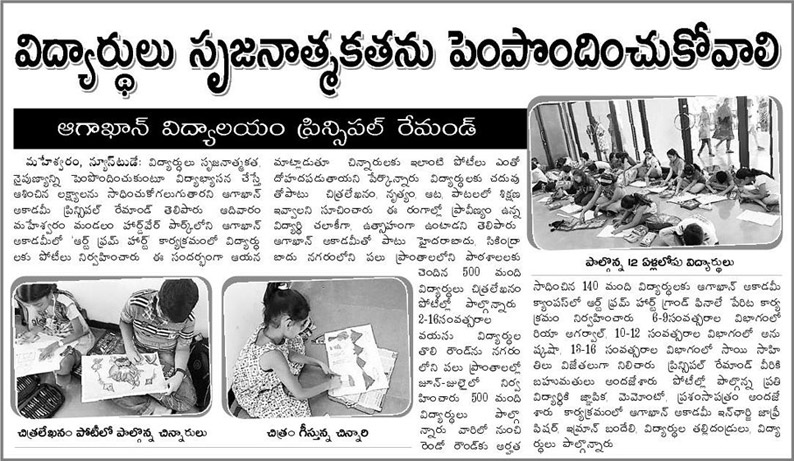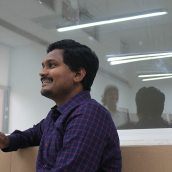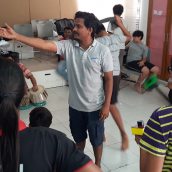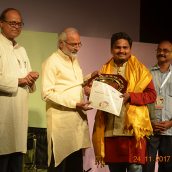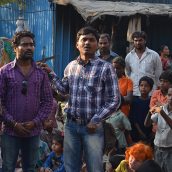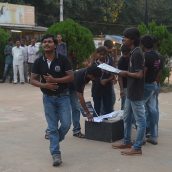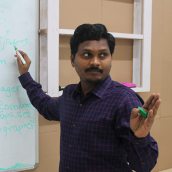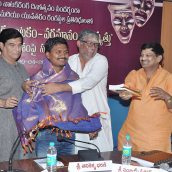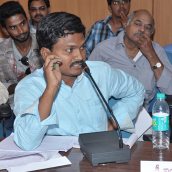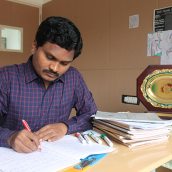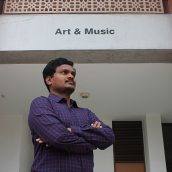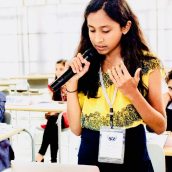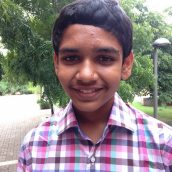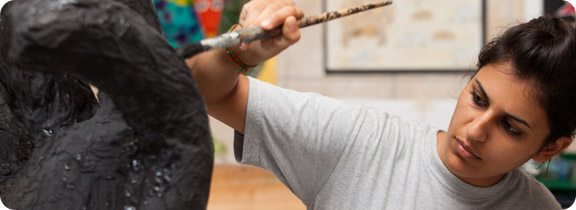
Educational Philosophy
Education is a creative, joyful process that engenders hope and curiosity. Through a diverse and rigorous curriculum, the Aga Khan Academies strive for the development of the whole person. Academies students will be able to contribute to and positively influence their communities. Through academic, athletic and artistic pursuits, they become lifelong learners and leaders.
Education is most relevant and inspiring when it connects young people to the world around them. By encouraging students to think flexibly and to connect their learning to real issues, the Academies build curiosity, compassion and a desire to make a difference.
The programmes of the International Baccalaureate curriculum have therefore been adapted to the specific environment of each Academy, with students developing a deep grounding in their local context alongside learning about relevant international issues and ideas.
An Academies education engenders a pluralistic and ethical approach to life and leadership.
Diverse educational experiences mean that students develop the willingness to embrace difference, and to learn from it. From the very youngest years, everyone works together to develop a sense of civic responsibility and service.
All students are encouraged to use their understanding and skills to take meaningful and sustainable action that makes a real difference to the lives of others.
"...above all, it is my hope that these schools will stimulate creativity, intellectual curiosity and honest inquiry so that their students can adapt and thrive in a world of rapid change; can make informed judgements on life’s daily challenges, and place those judgements in an ethical framework."
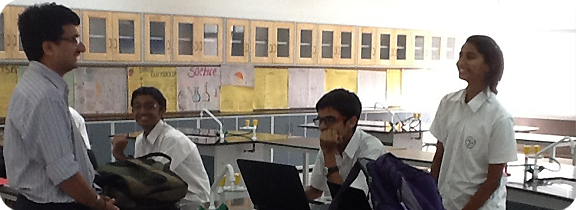
Faculty Development
Promoting excellence in teaching, both on campus and more broadly, is a fundamental goal of the Aga Khan Academies.
The effort to establish a Professional Development Centre (PDC) at each Academy is one of the outstanding features of the network. The PDC aims to strengthen the profession of teaching in the region by providing substantial professional learning opportunities and modelling highly effective educational practice.
Developing strength in teaching
The Academies aim to identify and develop teachers of the highest quality who are committed to both the all-round development of young people and to their own professional excellence. The Academy PDCs support excellence by striving to model best practices in teaching and learning within all of its classes and by providing high quality development opportunities for all Academy teachers.
Faculty members are also enriched by opportunities to work collaboratively with more experienced colleagues from around the globe and to teach abroad within the Aga Khan Academies network.
Investing in teachers
In addition to a broad programme of professional development for faculty and staff, the Academy PDCs offer substantial programmes under their Professional Learning for Educators Series (PLES) for teachers in local government, independent and not-for profit schools.
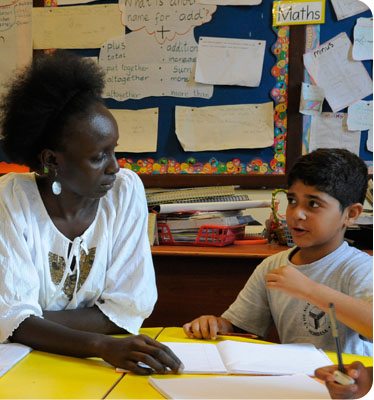
The PLES programmes are specifically designed by the Aga Khan Academies to respond to the needs of teachers, as identified through extensive market research and dialogue with government officials and education departments.
The series includes programmes for teachers in various subject areas as well as specialised programmes focussing on the skills and capabilities required for effective teaching.
Each programme builds professional competence by focussing equally on enhancing teachers’ subject knowledge and on how best to teach that subject. Each provides participants with a balance of intensive facilitated learning activities followed by an extended period of assisted application and observation within the context of their own classrooms.
To read about participants' experience of these programmes, click here.
"In this ambition, we are heartened by an important new World Bank study which indicates that it is not the quantity of time or money that leads to educational success, but rather the quality of specific educational experiences. The stimulus provided by extraordinary teachers and exceptional companions is most important."
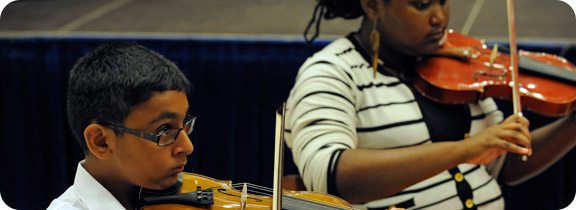
Enrichment Programmes
Enrichment programmes enable students to realise their potential in a variety of settings beyond the classroom. Students develop a sense of self-awareness and an understanding of school and community needs and opportunities. They also learn how to apply their gifts and skills to make a positive impact.
At the Academy, we believe in a balanced, rounded, comprehensive school experience. As this includes both academic and co-curricular experiences, we encourage our students to do their best both in and outside the classroom.
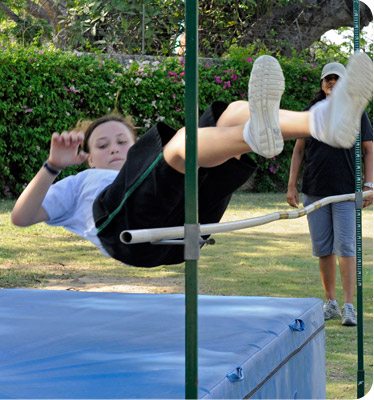 We offer outstanding sports facilities that include:
We offer outstanding sports facilities that include:
- Swimming and diving pools
- Cricket, soccer and hockey pitches
- Basketball and volleyball areas
- Tennis and squash courts
- Dance studio
- Gymnasium
- Athletics tracks
Children with special sporting gifts will be encouraged to develop their talents in every way. Children with special gifts in music, art or drama will similarly be encouraged through opportunities to practise and perform while at the Academy.
Our enrichment programmes are clustered into three main streams, each with a different focus:
Expression
Whether through visual or performing arts, this cluster engages students to think creatively and express their identities and thoughts aesthetically. Through theatre, art, music and drama, students learn to work together and infuse their projects with values and lessons from other parts of their schooling. Individual and collaborative creative projects emphasise growth and development through personal challenge, ultimately resulting in achievable personal goals.
Action
The student as a reflective practitioner is a basic tenet of the action cluster. Through physical sport, both competitive and non-competitive, students are challenged in their physical growth, and learn values such as good sportsmanship, teamwork and ethical behaviour. We encourage them to extend themselves by trying different activities and working with teammates to pass on their knowledge. In line with developing the student as a whole, a healthy lifestyle complements and enhances academic achievement.
Citizenship
At the Academy, we encourage knowledge and understanding of humanity and civil society. Through their involvement in citizenship activities, students gain an understanding of the practical implications of their work and study. By collaborating with community groups on sustainable projects, they develop an appreciation for human rights, human dignity and of how their actions impact the world around them.
To learn more about the Academy's programme, please visit the Academic Programme page.
Students improve their Creativity
Students empowered with creativity and skills can achieve their goals, contended Mr Raymond, Principal, the Aga Khan Academy. On Sunday, the Aga Khan Academy Hyderabad, located in Maheswaram Mandalam, Hardware Park, organised a competition for students called Art from Heart. On this occasion, Mr Raymond claimed that such competitions will help students in developing creativity. He also advised that students need to be trained in activities like drawing, music, sports, dance and so on, along with studies. These skills make students active and enthusiastic learners.
About 500 students from various schools in Secunderabad and Hyderabad had participated in the preliminary rounds which were conducted in the months of June and July. The age group targeted was between 2 to16 years.
Out of 500 participants, 140 students qualified for the next round. These students took part in the grand finale event of Art from Heart, organised on the campus of the Aga Khan Academy Hyderabad.
Rhea Agarwal in 6-9 years age group, Anushka Shaw in 10-12 years age group and Sai Sahiti in 13-16 years age group were the winners. The prizes were given away by the Principal, Mr Raymond. Each participant received a trophy, a memento and a certificate. In this event, the head of the the Aga Khan Academy Hyderabad, Dr Geoffery Fisher, Imran Bandeali, students and parents took part.
Read the original article:
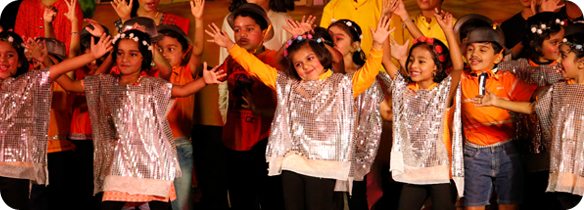
Primary Years Programme
The Aga Khan Academy Dhaka is an International Baccalaureate World School and has been authorised for the Primary Years Programme (PYP).
Foundations for lifelong learning
Our PYP curriculum for students in Grades 1-5 (aged 6-11) focuses on the development of the whole child. It is geared towards creating independent, confident and respectful learners.
Our classroom curriculum addresses the children's social, physical, cultural and ethical development while giving them a strong foundation in all the major areas of knowledge.
The curriculum consists of five essential elements:
- Concepts;
- Knowledge;
- Skills;
- Attitude; and
- Action.
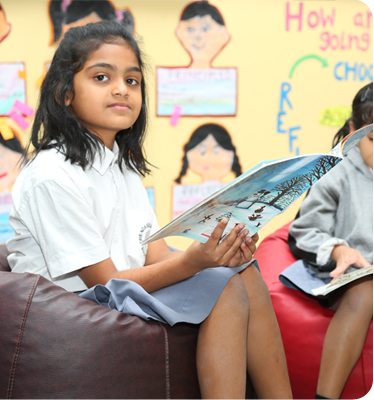 The core subjects we cover include English language, Bangla, mathematics, social studies, science and technology. Our programme also includes physical education, music and art. The use of Informational technology (IT) is integrated throughout the curriculum.
The core subjects we cover include English language, Bangla, mathematics, social studies, science and technology. Our programme also includes physical education, music and art. The use of Informational technology (IT) is integrated throughout the curriculum.
Students and teachers explore questions in all subject areas using an interactive, student-centred approach. This triggers students' curiosity, encouraging them to make connections with real-world issues. Students become active, autonomous learners who can take action as a result of their learning.
Our curriculum develops well-rounded students who are well-versed in all areas of knowledge. They learn to be intellectually curious, principled, caring, open-minded, well-balanced and reflective learners.
Please visit the Admission Requirements page to find out more about applying to Grades 1-5 at the Academy.
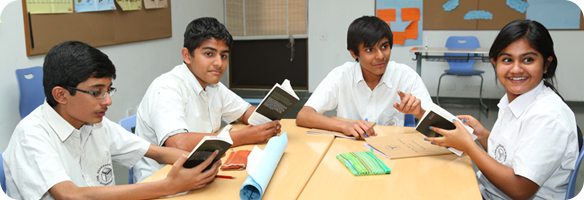
Middle Years Programme
The Aga Khan Academy Dhaka is an authorised International Baccalaureate (IB) World School offering the Middle Years Programme (MYP).Our MYP curriculum for students in Grades 6-10 is part of an integrated curriculum that forms a continuum from the Primary Years Programme (Grades 1-5) to the Diploma Programme (Grades 11-12).
Students study a broad and balanced range of disciplines, including:
- Languages;
- Literature;
- Sciences;
- Social sciences;
- Mathematics;
- Ats;
- Technology; and
- Physical education.
The five Aga Khan Curricular Strands, which are unique to the Aga Khan Academies, are integrated throughout the curriculum.
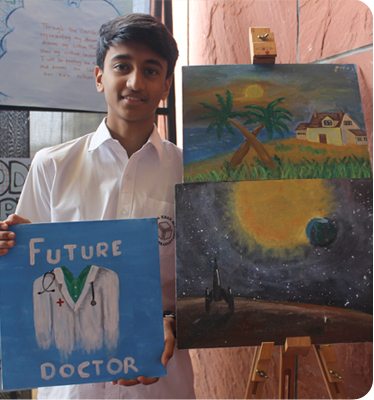 Learning in the middle years
Learning in the middle years
Our MYP students are immersed in a challenging and enriching educational environment. We ensure they master basic skills, develop the ability to analyse and think critically and become computer literate. We also emphasise the development of self-discipline and good work habits.
The programme encourages students to reflect on their learning and make connections with real-world issues. It also helps students develop an awareness of their thought processes and learning strategies, and of how they learn best.
The curriculum includes a service component that makes students aware of community and global needs. We also ensure that each student has a strong leadership experience and receives grounding in ethics, which helps prepare them for future leadership roles.
For further information about applying to Grades 6-10 at the Academy, please see the admission requirements.
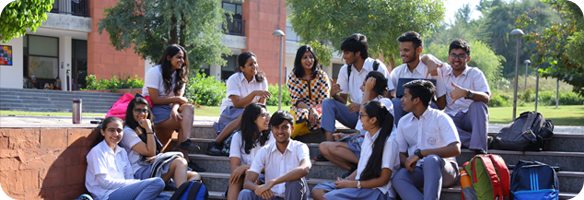
The Junior and Senior Schools
The Aga Khan Academy Hyderabad is made up of two schools, the Junior School and the Senior School, which together cater to students from grade 1 (age 6) to university entrance.
Junior School
All Junior School students follow the International Bacaalaureate (IB) Primary Years Programme (PYP). Through the PYP, our students learn to be confident, independent and creative learners.
The Junior School building has been designed to address the needs of younger children, with age-appropriate facilities and classrooms. In addition to the PYP classrooms, the building contains the Junior School library, and music, art and information technology rooms. There are also large playing fields and a playground.
Senior School
Students in the Senior School pursue either the IB Middle Years Programme or the IB Diploma Programme. Those from the local area can choose to attend as day students, while those from other parts of the country or region live on campus as part of the residential programme.
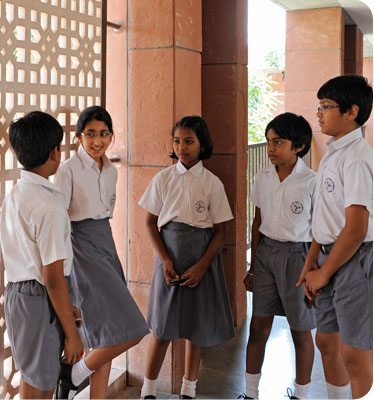 The Middle Years Programme is for students in grades 6–10. It helps them master essential skills and knowledge, and teaches them to be critical and analytical thinkers. The Diploma Programme is offered to students in the final two years of school. It is an internationally recognised and demanding programme that prepares students for university entrance.
The Middle Years Programme is for students in grades 6–10. It helps them master essential skills and knowledge, and teaches them to be critical and analytical thinkers. The Diploma Programme is offered to students in the final two years of school. It is an internationally recognised and demanding programme that prepares students for university entrance.
The school caters to both the intellectual and personal growth of students. It has a wide range of facilities that include:
- laboratories for the sciences and information technology
- art and music rooms
- library and resource centre
- career counselling centre
- student and teacher lounges
- cafeteria and dining area.
The building is networked so that computers become common resources for teachers and students. The multipurpose hall can be used for a variety of events ranging from theatre productions to parent–teacher meetings. The school also has swimming facilities as well as playing fields for soccer, field hockey and athletics.
For further information about applying to any of the programmes offered at the Aga Khan Academy Hyderabad, please refer to the admission requirements.
Chandrasekhar Indla - Holding the baton of Telugu theatre
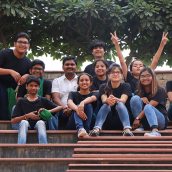 All the world's a stage, Shakespeare famously wrote, and all the men and women merely players. Chandrasekhar Indla, drama faculty at the Academy’s theatre arts department, would take a dim view of such a simplistic description of a stage play. As director, lighting designer, sound technician, mask-maker and writer, Chandra has been a part of hundreds of performances and, talking to him, you would believe that the stage is possibly more than the world, and players perhaps more than merely men and women. “Drama is an important instrument that can build a sense of consciousness in society,” he shares. “There is a need to save and reinvent drama.” For over five years now, he has dedicated his career to introducing children to the world of theatre arts.
All the world's a stage, Shakespeare famously wrote, and all the men and women merely players. Chandrasekhar Indla, drama faculty at the Academy’s theatre arts department, would take a dim view of such a simplistic description of a stage play. As director, lighting designer, sound technician, mask-maker and writer, Chandra has been a part of hundreds of performances and, talking to him, you would believe that the stage is possibly more than the world, and players perhaps more than merely men and women. “Drama is an important instrument that can build a sense of consciousness in society,” he shares. “There is a need to save and reinvent drama.” For over five years now, he has dedicated his career to introducing children to the world of theatre arts.
A prolific academic, Chandra was among highest scorers in the National Eligibility Test, an exam held nationwide by the University Grants Commission (UGC) which qualifies people to teach performing arts at a collegiate level. His work since his first tenure as a master’s student at the University of Hyderabad has been about introducing drama to a young audience. He was among the first members of the university’s Theatre Outreach Unit, created to expose children all over the state to theatre arts. He joined the Aga Khan Academy Hyderabad in 2015 to continue in this effort. “Our Academy is one of the best places where the teacher-student relationship is so strong in terms of respecting each other and sharing thoughts,” he says. Chandra, not a technical direcor for drama at the Academy, was very happy to teach at the Academy because the IB curriculum gives theatre arts the importance of a elective, rather than just tacking it on as a co-curricular activity as other school programmes do.
With two master’s degrees and a PhD on the way, Chandra surprisingly admits he wasn’t very good at school. In fact, he even struggled through his first degree, a bachelor’s in computer science. “I don’t remember any programming today,” he confides. Once Chandra relieved himself of his pursuits in technology and began honing in on theatre, his academic performance drastically improved. He finished his master’s in performing arts with a gold medal from the University of Hyderabad, and went on to earn two prestigious research fellowships from the UGC to write about theatre arts. These fellowships sustained him for nearly six years. “My family was happy to find out I was going to pursue theatre arts, because my paternal uncle is an author, and they thought he could help me.”
Chandra was born in Kanduluru in Andhra’s Prakasam district where his parents worked for daily wages, often at construction sites or in the tobacco fields of of the coastal district. “He was into old, traditional theatre arts,” Chandra says of his uncle. “Today I’m in national theatre festivals. I have more contacts than him,” he adds, laughing. Indeed, Chandrasekhar Indla has become a recognisable name in Telugu literary circles. This began when his final master’s project, a play adaptation of the book Gopathrudu by K.N.Y Pathanjali, became a sensation in theatres across Andhra Pradesh (before the creation of Telangana State). He followed this with another adapted play called Miss Meena, based on the tragicomedy The Visit by Friedrich Dürrenmatt. Ms. Meena was performed over a 100 times statewide, earning Chandra a reputation as tested thespian. Apart from this, Chandra has also spoken and presented about Telugu theatre at international conferences.
“As a professional admirer of drama I would like to hand over the future of drama to the students to take it further,” he says. Since his joining the Academy, our students have held performances across the city, attended several festivals and plays, and most notably, entered the Amaravathi National Theatre Festival in 2017. “I had the freedom to run and develop the department,” he says of being the first drama teacher at the school. “I have used this freedom to develop the students’ abilities in acting, communication, confidence, creativity and thinking skills.” With the addition of George Macpherson to the drama department as of August 2018, the programme has only gained in strength. “We’ve built a whole new teaching strategy together,” Chandra says of his friend and colleague George. “As a practioner, I'm more comfortable teaching the the practical aspects of theatre, whereas George is very good at teaching theory."
Inevitably, Chandra went from adapting literature to the stage to creating literature himself. As of date, he has been published in Telugu literary magazines 12 times, and has a collection of short stories on the way. One of the major motifs in Chandra’s writing is social equality and social reform. At the Aga Khan Academy Hyderabad, where pluralism is one of the tenets of the school’s ethos, Chandra is a person students can look up to who shows these values in his work and personal life. Chandra met his wife Ezhilmathi in 2009 when they were doing their master’s of philosophy in performing arts at Pondicherry University. His area of focus was drama while hers was music. “She taught me Tamil,” he says, “I think that’s where it began.” The two had to convince their parents before they could get married. “My marriage is inter-state, inter-faith, inter-caste,” he laughs. In August 2012, Chandrasekhar and Ezhilmathi were married in a wedding with both Hindu and Christian rituals.
“Drama can build self-confidence in a person. However, most people do not have proper understanding or admiration of drama,” Chandra says. Looking out of his office window at an overcast December morning, Chandra’s thoughts about his art turn bleak. “No one reads scripts,” he says of the culture of literature in the subcontinent. “People will just read Shakespeare as a play, but that is not the case for Telugu literature.” The shields and trophies on his desk gleam in the wintry light. “Maybe this culture of drama will die out one day."
Though the thought is dark, Chandra doesn’t let it get in the way of his work, and rather uses it to fuel his work as a teacher. He knows that many of his students will go on to pursue, say, computer science, but that doesn’t deter him. “I want my students to be good humans who are not only responsible but also sensitive to others’ emotions and culture. Drama needs to be handled more as a legacy and its nuances need to be inherited and passed on generation after generation. This is possible only when I take up the role of a teacher.”
Written by Ajay Sundaram
Gitika Joganpally - aspiring journalist intent on service and action
Advait Surana: Academy football champion represents Telangana state
“I always wanted to play, but I never got a chance to in my previous schools. One of the reasons I joined the Academy was its sports facilities.”
Advait Surana is a residential grade 10 student at the Aga Khan Academy in Hyderabad. He was selected as one of 18 students from different schools to represent Telangana state at the national U-15 football tournament in Delhi in early September 2016. This was the first time that Telangana reached the quarter finals, where they lost to Haryana who eventually went on to win the cup.Advait, who started taking football seriously after he joined the Academy two years ago, underwent rigorous training and practice before the national tournament. He had first been observed while representing the Academy at a Rangareddy district football competition.
“My goal is to participate in the U-18 in a few years,” said Advait. “I haven’t thought about playing football professionally after that, but it is an option.”
Advait aspires to become a software engineer. As part of his International Baccalaureate grade 10 personal project (an independent and practical exploration in which students connect classroom learning engagements with their own experiences and interests), he is building a mobile app that has riddles and puzzles for all age-groups.
However, sport is always on his periphery. When asked why he thinks he was selected, he declared with confidence: “I practiced a lot, and I think I deserved it. I think I was better than the other kids.”
The Academy is incredibly proud of Advait’s achievement, as testament to our commitment to holistic education and the development of student talent across the board, in both academic and extra-curricular activities.
